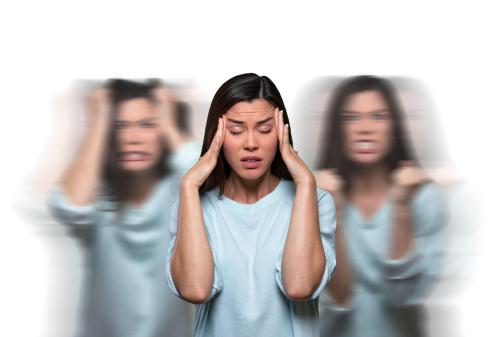In today’s busy world, we’re pulled in many directions at once. We have responsibilities at home and at work. Sometimes it all just becomes too much. Our bodies start to let us know that we’re feeling the stress of our daily lives. Feelings of stress are caused by your body’s instinct to defend itself. This instinct is good in emergencies, such as when you need to get out of the way of a speeding car. But stress can cause unhealthy physical symptoms if it isn’t managed properly.
Your body is working overtime as it deals with daily challenges. You’re just not equipped to deal with all the extra energy. You may start to feel anxious, afraid, worried, and uptight. If your stress isn’t kept under control, it can lead to serious health issues such as high blood pressure, heart disease, and diabetes.

What is stress?
Stress affects us in lots of ways, both physically and emotionally, and in varying intensities.
Research has shown that stress can sometimes be positive. It makes us more alert and helps us perform better in certain situations. However, stress has only been found to be beneficial if it is short-lived. Excessive or prolonged stress can lead to illnesses such as heart disease and mental health problems such as anxiety and depression.
During situations that make you feel threatened or upset, your body creates a stress response. This can cause a variety of physical symptoms, change the way you behave, and lead you to experience more intense emotions.

How stress works: The stress response
When you feel threatened or in danger, your body’s stress or “fight or flight” response is automatically triggered. Your nervous system releases a flood of stress hormones, including adrenaline and cortisol, which rouse the body for emergency action.
Your heart pounds faster, muscles tighten, blood pressure rises, breath quickens, and your senses become sharper. These physical changes increase your strength and stamina, speed up your reaction time, and enhance your focus—preparing you to either fight or flee from the danger at hand.

What causes stress?
Stress is how your body reacts to a change or challenge, and many different things can lead to it. Stressors can also be positive or negative. For instance, getting a new job or losing a job can both cause stress. Other causes of stress include:
- An illness or death of a loved one.
- Marriage, separation or divorce.
- Financial issues.
- Moving to a new house.
- Going on vacation.
- Having a baby.
- Retiring.
Stress can also be acute, meaning short term. Causes of acute stress may include everyday stressors, like:
- Studying for a big test.
- Getting ready for a work presentation.
- Having an argument with a friend or loved one.
- Needing to get a lot completed in a short amount of time.
- Experiencing many small problems all at once, like getting in a traffic jam, spilling coffee all over yourself and running late.

Physical symptoms of stress
People react differently to stress. Some common symptoms of stress include sleeping problems, sweating, or a change in appetite.
Symptoms like these are triggered by a rush of stress hormones in your body which, when released, allow you to deal with pressures or threats. This is known as the ‘fight or flight’ response. Hormones called adrenaline and noradrenaline raise your blood pressure, increase your heart rate and increase the amount you sweat. This prepares your body for an emergency response. These hormones can also reduce blood flow to your skin and reduce your stomach activity. Cortisol, another stress hormone, releases fat and sugar into your system to boost your energy.
As a result, you may experience headaches, muscle tension, pain, nausea, indigestion and dizziness. You may also breathe more quickly, have palpitations or suffer from various aches and pains. In the long term, you may be putting yourself at risk of heart attacks and strokes.
Humans have inherited these things from our ancient ancestors, who needed to be able to either run away from danger or stay and fight. Once the pressure or threat has passed, your stress hormone levels usually return to normal. However, if you’re constantly under stress, these hormones remain in your body, leading to the symptoms of stress. If you’re stuck in a busy office or on an overcrowded train, you can’t run away, so you can’t use up the chemicals your own body makes to protect you. Over time, the build-up of these chemicals and the changes they produce can be damaging to your health.

Behavioural and emotional effects of stress
When you are stressed you may have lots of different feelings, including anxiety, irritability or low self-esteem, which can lead you to become withdrawn, indecisive or tearful.
You may have periods of constant worry, racing thoughts, or repeatedly going over the same things in your head. Some people experience changes in their behaviour. They may lose their temper more easily, act irrationally or become more verbally or physically aggressive. These feelings can feed on each other and produce physical symptoms, which can make you feel even worse. For example, extreme anxiety can make you feel so unwell that you then worry you have a serious physical condition.

Strategies for Managing Stress and Anxiety
There are strategies that can help us manage stress and anxiety, allowing us to live a more peaceful and fulfilling life. We’ll explore 10 strategies for managing stress and anxiety in daily life.
Practice Mindfulness
Mindfulness is the practice of being present in the moment without judgment. It involves focusing on your breath, body, and surroundings and observing your thoughts and emotions without reacting to them. Mindfulness has been shown to reduce anxiety and stress levels, improve mood, and increase self-awareness. Take a quiet moment today to rejuvenate your mind.
Get Enough Sleep
Sleep is not only essential for our bodies, but it’s also essential for our mental well-being as well. Lack of sleep can cause fatigue, irritability, and difficulty concentrating, exacerbating stress and anxiety. Each night when we sleep, the chemicals released cleanse our brain of all the day’s toxic build-up. Without that cleanse, we cannot function effectively; over time, our bodies and minds begin reacting very harmfully.
Aim for 7-9 hours of sleep per night and establish a consistent sleep schedule to promote healthy sleep habits.
Exercise Regularly
Exercise is a natural stress reliever and mood booster. It releases endorphins, which are natural chemicals in the body that reduce pain and boost pleasure. Aim for 30 minutes of moderate-intensity exercise, such as walking, biking, or swimming, most days of the week to reap the benefits of exercise on stress and anxiety.
Practice Gratitude
Gratitude is the practice of focusing on the positive aspects of life and appreciating what you have. Gratitude has been shown to improve mental health, increase happiness, and reduce stress and anxiety levels. Take time each day to reflect on what you’re grateful for, whether it’s a person, experience, or something as simple as a beautiful sunset.
Use Relaxation Techniques
Relaxation techniques like deep breathing, progressive muscle relaxation, and guided imagery can help reduce stress and anxiety levels. These techniques involve consciously relaxing your muscles and focusing on calming thoughts or images, which can promote a sense of calm and relaxation.
Maintain Social Connections
Social connections are essential for mental health and well-being. Spending time with friends and family, joining clubs or groups, and volunteering can all help promote social connections and reduce stress and anxiety levels.
Practice Time Management
Poor time management can lead to increased stress and anxiety levels. Prioritizing tasks, creating schedules, and setting realistic goals can help manage time more effectively and reduce stress levels.
Limit Screen Time
Excessive screen time can lead to increased stress and anxiety levels. Limiting screen time, especially before bedtime, can promote healthy sleep habits and reduce stress levels.
Practice Self-Care
Self-care involves taking care of your physical, mental, and emotional health. This can include activities such as taking a relaxing bath, reading a book, or going for a walk. Practicing self-care can reduce stress and anxiety levels and improve overall well-being.
Seek Professional Help
If stress and anxiety interfere with daily life, it may be beneficial to seek professional help. A mental health professional can provide counseling, medication, or other treatments to help manage stress and anxiety levels. I am intensely amazed at Gen Z, who has really brought attention to this topic. The rest of us can model their attention to mental health for themselves and others.














Leave a comment